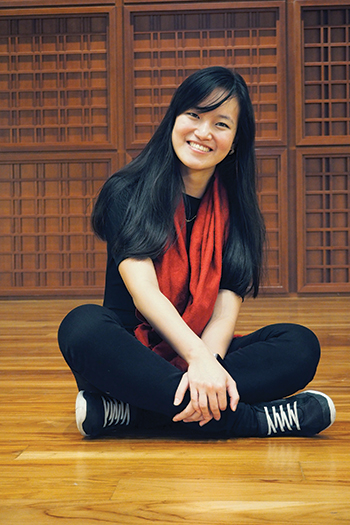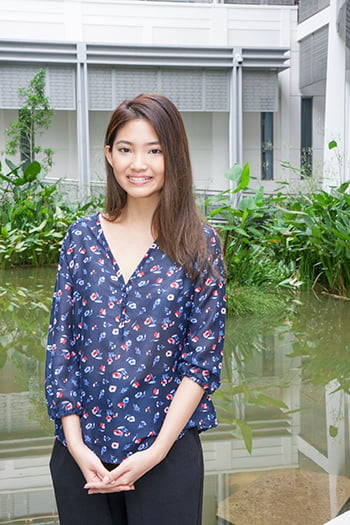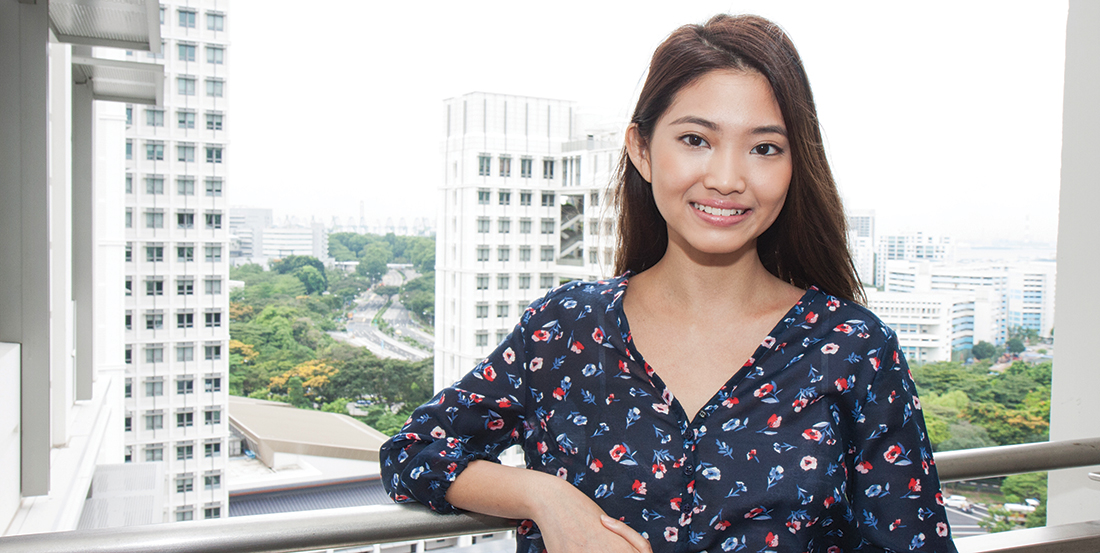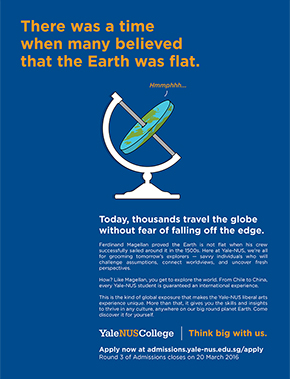E stablished by two world-renowned universities, the National University of Singapore (NUS) and Yale University, Yale-NUS College is an autonomous college within NUS. It is Singapore’s first liberal arts college that prepares young people for leadership in a complex and interconnected world.
It offers students a solid liberal arts education, through which they gain breadth and depth of knowledge in the Social Sciences, Humanities, Arts, Natural and Physical sciences, and Mathematics. Students are exposed to these subjects in their first two years through the Common Curriculum, before they embark on their chosen major in their third and fourth year. Another unique aspect of the liberal arts college is its residential college model, which integrates living and learning and fosters a sense of community among students.
Today, we hear from two Yale-NUS students who regale us with their enriching undergraduate experiences. Global Affairs major Andrea Lee and Philosophy, Politics and Economics major Joan Ongchoco talk to us about living on campus, their unique overseas experiences and Yale-NUS’ stellar faculty.
What sparked your interest in your chosen major?
Andrea Lee: As a teenager, I would always keep up with world news and politics, and found that these topics were the ones that I was intellectually curious about and felt strongly for. I decided that I wanted to explore the theories and concepts of international relations a little more, so I enrolled in a few global affairs electives and found that I really enjoyed them. Declaring a Global Affairs major came naturally after that.
Joan Ongchoco: “It now became the interest of men to appear what they really were not.” This was the problem articulated by Rousseau, in one of the texts that we had to read for the common curriculum course, Philosophy and Political Thought. This problem bothered me quite a bit, and I felt I could investigate this further by majoring in a field of study that intrigued me. “It now became the interest of men to appear what they really were not.” This was the problem articulated by Rousseau, in one of the texts that we had to read for the common curriculum course, Philosophy and Political Thought. This problem bothered me quite a bit, and I felt I could investigate this further by majoring in a field of study that intrigued me.
How has living on campus given you a holistic student life?
Andrea: Living on campus has definitely been a transformative experience. I live together with three of my closest friends from freshmen year, in a suite for four people. They are my closest support network and I have also learnt a lot from them. We come from different backgrounds and countries so whenever we discuss common course material, everyone offers a different perspective based on the type of environment they have experienced living in. Most of the time, they bring insights to the table that I would never have considered, and this is a great learning experience for me.

Joan Danielle Ongchoco
Studying:
Bachelor of Arts (with major in Philosophy, Politics & Economics) (Honours)
Joan: Living on campus means I am never learning, never dancing, and never laughing alone in this college. Whether it is in the lifts, dining hall, dressing room or college courtyard, I have gotten to know and be inspired by people, their passions and their idiosyncrasies. I have also laughed and cried with my closest friends, and mused over the most random questions from how to systematically estimate the number of insects in the world to what it means to be one’s truest self.
Share with us about some memorable episodes you have had as an undergraduate.
Andrea: I’ve travelled extensively with Yale-NUS for a wide array of activities. This includes my NGO internship to Anhui, China, and my Yale Summer Programme in Prague.
Apart from this, I’ve travelled with the Yale-NUS International Relations Association (YIRPA) to attend Model United Nations (MUN) conferences overseas. This has brought me to Taipei, Seoul, Beijing and Jakarta. In March 2015, our team competed at the Harvard World MUN held in South Korea, which allowed us to bring home four individual accolades, the best showing of a Singapore delegation ever! I’ve also flown down to New Haven to meet with our sister organisation at Yale for an exchange in best practices and to discuss future collaborations, given that we are similar in vision and mission.
This is a great deal of travelling, and I am fortunate that the school is so supportive of the concept of learning beyond boundaries.
Joan: In the summer of 2015, I did a Summer Independent Research programme where I worked in the laboratory of Professor Marvin Chun, Richard M Colgate Professor of Psychology and Neurobiology at Yale University. During this time, I conceptualised and ran three successful experiments relating visual stimuli and theory of mind, or the ability to read people’s emotions based on their body language. I am currently on track to publishing a paper as first author based on my research, which discusses how dance can be used to study the mind, exploring the intersection between Psychology and dance. The manuscript has been submitted to Psychology Bulletin Review recently and this whole journey has been most fulfilling! The journal is currently going through peer review by other professors, before it gets published.

Lee Shanyi Andrea Noelle
Recipient of the Sharon Ann Eravelly Scholarship
Studying:
Bachelor of Arts (with major in Global Affairs) (Honours)
Tell us about Yale-NUS’ faculty.
Andrea: The faculty we have at Yale-NUS is amazing. The professors are extremely dedicated to helping the school achieve its mission and vision, and always make themselves available to students for consultations and career guidance. Many times, conversations in the classroom carry on to the dining halls, where we have intellectually curious students engaging professors in debates about different philosophical perspectives. Professors are also receptive to the feedback that we give, and are constantly improving on teaching methods and in-class assignments to make classes even more effective.
Joan: If there’s one thing I love about our school’s professors, it is that they care. They genuinely care for our learning, and also for us in general. They are certainly very integrated in the Yale-NUS community and closely connected with the student body. I think that this allows them to teach better, because they know the things that are relevant to us, whether it is a community problem or an individual interest. This connection allows them to tailor discussions and engage with us more.
What advice would you have for future students of Yale-NUS?
Andrea: Make friends you can be vulnerable with, for they will teach you important life skills and be there for you in the toughest of times. Also, don’t be afraid to step out of your comfort zone and try something new – if you don’t do it now, there never will be as supportive a community to cheer you on.
Joan: Yale-NUS has taught me one thing that I always tell myself before I go on stage for a research presentation or dance performance – that I have nothing to lose, but everything to share. I hope you keep this in mind as you apply for colleges and try to figure out what your best fit is!

